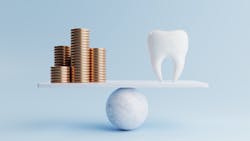New data on what dentists make
Yahoo Finance has curated data from the US Bureau of Labor Statistics (BLS) and other sources indicating that the mean dentist salary nationally is $167,160, with the ADA reporting the average net income in 2020 at $170,160 for general dentists and $323,780 for specialists.
Other findings of note include:
- The national average starting salary for dentists is $61,355, significantly less than the national average across the profession.
- The effect of city and state on earnings is significant, with the mean general dentist salary in Illinois reported at $136,930, while Wyoming- and Vermont-based dentists earn $148,730 and $190,030, respectively. Salaries between different areas in the same state can also vary considerably, such as in California, where general dentists in the San Francisco metropolitan area earn a mean wage of $181,700 per year and Los Angeles dentists, $151,540.
- Some top-paying dental specialties and their mean annual wages include oral and maxillofacial surgeon ($311,460) and orthodontist ($267,280).
First-year dental student awarded patent for aerosol protection system
A collaboration among brothers led to the development of an aerosol protection system for which a first-year dental student in New Jersey has been granted a patent. Formerly a mechanical engineer, Mujahid Asamarai attends Rutgers School of Dental Medicine in Newark and when his brother, a dentist in Minnesota, expressed needing help keeping his patients safe earlier in the pandemic, ultimately he created the Dental Aerosol Protection System.
The system includes an adjustable, self-balancing shield placed between the patient and practitioner to block aerosols from the patient’s mouth and a 3D-printed aerosol collection funnel. As well, “It wasn’t incredibly expensive and wasn’t invasive to the operatory, which was important” for his brother, said Asamarai. “It could be installed and removed without causing any damage to the operatory or dental chair.”
ICYMI: A promising approach to dental anxiety
A study at Temple University’s Kornberg School of Dentistry in Philadelphia combines the knowledge and experience of dentists and psychologists to examine whether exposing patients to their dental fears through a series of videos—an approach called exposure therapy—can help them manage their anxiety.
Some 450 study participants pick their three most anxiety-producing procedures from a list of six— cleanings, x-rays, cavity fillings, root canals, injections, and tooth extractions—and watch a series of videos about those three procedures, starting with their least-feared.
The computer-based intervention incorporates several cognitive behavioral techniques with the idea of working with patients to develop a “hierarchy of fear,” while at each level of exposure encouraging them to develop strategies to cope—an approach of “Facing that fear, letting that anxiety peak, using those skills to face that anxiety,” says Eugene Dunne from the Kornberg School of Dentistry.
About the Author
Elizabeth S. Leaver
Digital content manager
Elizabeth S. Leaver was the digital content manager for Endeavor Business Media's dental group from 2021-2024. She has a degree in journalism from Northeastern University in Boston and many years of experience working in niche industries specializing in creating content, editing, content marketing, and publishing digital and magazine content. She lives in the Boston area.
